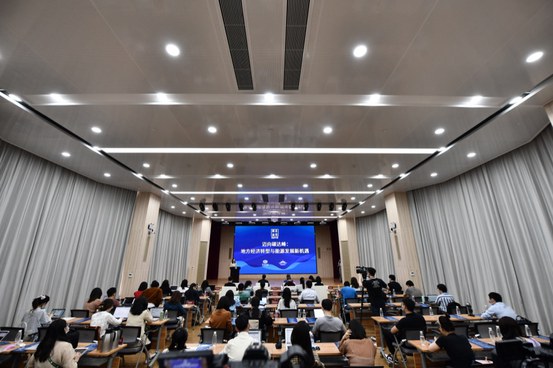Energy Forum Highlights Ambitious Carbon Goals and Local Action
In mid-May 2021, Energy Foundation China (EF China) and media outlet China News Service held the fourth event of the “Sustainable Energy for a Prosperous China” forum series for journalists, focused on early peaking of carbon emissions, fast and ambitious local action, and the energy sector. Leading policy advisors and experts provided insights to 50 journalists on the opportunities and key steps with China’s new 2030 carbon peaking and 2060 neutrality targets for local economy and the ongoing energy transition.

Photo credit to China News Service
Wang Xiaohui, editor-in-chief of China News Service, and Zou Ji, CEO and president of EF China delivered opening remarks. Ms. Wang said in her speech that China needs to do more to reach the carbon peaking and neutrality goals. The goals are the new mission of the era, which conform to China’s historical trend and show great progressiveness, said Prof. Zou. He also emphasized the importance of local practice under China’s condition. This forum had three sessions, covering China’s new opportunities with the carbon peaking and neutrality goals, energy reform for high-quality peaking, and provincial and local action.
According to Zhu Min, dean of Tsinghua’s National Institute of Financial Research, the new carbon goals provide huge opportunities for China’s economic transformation and technological innovation. “This is not only a story of green emissions, but a huge opportunity to rebuild China’s economy. Innovation will be a major starting point and driving force, which will attract huge investment. All sectors of the economy should actively engage in this change,” said Prof. Zhu. Du Xiangwan, deputy director of the National Energy Advisory Expert Committee pointed out that China’s carbon intensity must be reduced to achieve early peaking, considering the country’s rapid economic growth. He also emphasized that decarbonization goals and energy security targets are compatible in China. Prof. Zou analyzed the logic of a new growth story for China in light of the ambitious carbon goals. He also shared preliminary findings of EF China’s research on provincial economic growth and carbon peaks: 13 provinces have achieved carbon peaks, accounting for 40 percent of China’s total emissions; 10 provinces are close to their carbon peaks, accounting for another 40 percent; the remaining 7 provinces continue to grow their carbon emissions, accounting for 20 percent. According to the findings, China can peak its emissions by 2025, he said. “With hard work, we hope China can achieve carbon peaking at the end of the 14th Five-Year Plan period, in advance of the current goal, and cap the energy-related carbon emissions peak at 10.3 billion tonnes.”
During the session about energy reform, Li Junfeng, former director of the National Center for Climate Change Strategy and International Cooperation; Jiang Liping, vice president of the State Grid Energy Research Institute; Ye Yanfei, director-general at the Policy Research Bureau of the China Banking and Insurance Regulatory Commission; and Dang Yanbao, chair of Ningxia Baofeng Energy Group discussed how different regions/provinces should set their carbon peaking schedule, what issues need to be considered in the energy transformation, and how new energy industries can help achieve China’s ambitious decarbonization goals.
The last session on provincial action featured experts such as Chai Qimin, director of strategy and planning at the National Center for Climate Change Strategy and International Cooperation; Tang Jie, former deputy mayor of Shenzhen; and Fu Sha, director of EF China’s Low Carbon Economic Growth Program and Strategy and Planning section.




